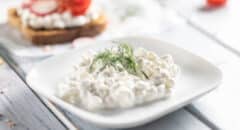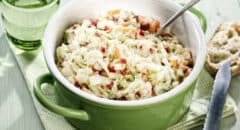 There are many benefits to being vegetarian and vegan. Regardless of why you chose such a lifestyle, it’s not enough to simply cut the meat, poultry, and seafood from your daily menu. Animal products do offer nutrients that support growth, body functions and a healthy immune system, and it’s important that these nutrients are acquired from another food source after you stop eating meat.
There are many benefits to being vegetarian and vegan. Regardless of why you chose such a lifestyle, it’s not enough to simply cut the meat, poultry, and seafood from your daily menu. Animal products do offer nutrients that support growth, body functions and a healthy immune system, and it’s important that these nutrients are acquired from another food source after you stop eating meat.
Every committed vegetarian should pay special attention to seven key nutrients to ensure that a plant-based diet is also a healthful one.
1. Protein
When you tell people you don’t eat meat, a question about protein usually follows. Although many people associate meat with protein, you can meet your protein needs with plenty of plant-based sources. Unfortunately, new and seasoned vegetarians are often guilty of removing meat, poultry and fish from their diets without a reliable plan to replace those animal proteins with vegetarian proteins. To eat the same foods—pizza, sandwiches, pasta dishes and stir fries—minus the meat –can leave you feeling hungry and your meals unbalanced (high in carbs and fat, low in protein). So how much protein do you need?
An easy rule of thumb is that your daily protein requirement is the same as your weight in kilograms. (Simple divide your weight in pounds by 2.2.
2. Vitamin B-12
Vitamin B-12 is responsible for red blood cell growth and nervous system maintenance, but when the only unfortified, natural sources of this vitamin are meat, dairy and eggs, vegetarians—and especially vegans—often lose out. Go too long without adequate B-12 and you may find yourself at risk for macrocytic anemia, a type of abnormality in red blood cell development, as well as shortness of breath, heart palpitations, numbness and tingling in the hands and feet, memory loss, dizziness, mood changes, loss of vision and irreversible nerve damage. To ensure you get enough B-12, select eggs and dairy products daily. For those who don’t eat eggs or dairy, look for vitamin B-12 in fortified vegan cheese, yogurt, and non-dairy drinks; fortified cereals; fortified veggie burgers and faux meats; and nutritional yeast. Based on personal choice, one of these recommended plans should be used to ensure adequate vitamin B-12 intake:
Daily Intake: Healthy adult males and females need 2.4 micrograms (mcg) of vitamin B-12 daily based on the recommended dietary allowance (RDA). This RDA assumes that one’s intake is spread over the course of a day for improved absorption, using foods high in vitamin B-12 as listed above.
Daily Supplement: If supplementation is necessary, choose a multivitamin-mineral supplement that provides at least 10 mcg of B-12.
Weekly Supplement: If a larger dose supplement is used weekly, then the supplement should contain 2,000 mcg of B-12 and be taken once a week.
3. Calcium
Most of us know that the mineral calcium is important for bone and overall health, but many people don’t consume enough. Adults 18 to 50 years old need 1,000 milligrams (mg) per day, while those 51 and older need 1,200 mg daily. Calcium can be a concern for vegans and vegetarians who do not eat any milk or dairy products.
Similar to the advice that you must replace what you take out (meat) with something nutritionally similar (plant-based proteins), the same holds true for calcium. If you do eat dairy, aim for about three low-fat servings per day. If you consume less than that (or none at all), keep your body’s blood-clotting and bone-building abilities up to par by including non-dairy calcium foods like chickpeas, broccoli, dried figs, enriched whole-wheat bread, calcium-set tofu, and calcium-fortified soy cheese, orange juice, or cereal in your daily diet.
4. Vitamin D
Our bodies produce the bone-forming vitamin D when we expose our skin to the sun, but cloud cover, long winters, indoor jobs, and the widespread use of sunscreen mean we’re not hitting our daily targets. There aren’t many food sources for vitamin D—especially if you’re vegetarian or vegan. Vitamin D is added to commercially bought milk and many yogurt products, and it occurs naturally in salmon and egg yolks. As vitamin D continues making headlines, we’re starting to see it added to additional food products, including non-dairy milks, fortified cereals, and other packaged foods. The current recommended intake for vitamin D is 600 International Units (IU) for adults up to age 70 years, and for adults 71 or older the recommendation is 800 IU. Talk to your doctor about your exact vitamin D need, if a supplementation is right for you, the type of supplement and the amount to take daily.
There are two forms of supplemental vitamin D: vitamin D2 (generally made from yeast) and vitamin D3 (made from the skins of sheep, cows, pigs and sheep’s wool). Researchers have found vitamin D2 is only about 60 percent as effective as vitamin D3 in raising serum vitamin D levels. However, it makes sense that vegetarians prefer the D2 form, which is not of animal origin. Because it isn’t utilized as effectively, many experts suggest that vegetarians who rely on vitamin D2 consume 1.7 times the RDI. This means the intake for up to 70 years of age should be 1,020 IU of D2 daily (25.5 mcg); and after the age of 70 it should be 1,360 IU (34 mcg) of D2. Learn more about vitamin D, where to find it, and how to pick a high-quality supplement here.
5. Iron
Iron serves as an essential part of hemoglobin, which carries oxygen in your blood from your lungs to every body cell. Iron comes in two forms: heme, which is better absorbed, and non-heme, which is not absorbed as readily. According to the Institutes of Medicine and The Vegetarian Resource Group (VRG), 40% of the iron found in meat, poultry and fish is heme, while the other 60% is non-heme. All plant-based sources of iron are non-heme, which is why the RDA for iron is higher for vegetarians than it is for meat eaters. According to the Institutes of Medicine, vegetarian men and post-menopausal women need 14 mg daily and pre-menopause vegetarian women should aim for 33 mg each day. While non-heme iron isn’t as readily absorbed as heme iron, a few simple steps can influence the absorption of iron:
Select a variety of plant-based iron-rich foods daily, such as legumes, fortified veggie meats, nuts and seeds, prunes, raisins, blackstrap molasses, fortified cereals and grains, kale, and broccoli. Do not rely on spinach, beet greens, rhubarb, and Swiss chard for your iron. An acid in these veggies called “oxalates” binds with the iron, making it unavailable for the body. Eat iron-rich plant foods along with fruits and veggies that are rich in vitamin C during the same meal or snack to increase absorption.
Use cast-iron pots and pans to cook your food, especially acidic foods such as tomato sauce. This will increase the amount of iron in your food.
Do not drink tea or coffee with your iron-rich foods. The tannins in the tea and coffee can decrease the absorption of the iron. Some herbal teas, such as chamomile, peppermint, lime flower, and pennyroyal, can also decrease absorption.
If you are in doubt about your iron intake, talk to your doctor. A simple test can determine your iron level.
6. Zinc
Zinc is crucial for metabolism, immunity and healing. Meat, seafood and animal products are high in zinc, and according to the National Institutes of Health, some vegetarians need 50% more than the recommended 40 mg for adults over 18. Why? Because zinc found in plant foods has a lower absorption.
To maximize your zinc intake:
Include a variety of zinc-rich foods throughout the day, such as whole grains, wheat germ, tofu, tempeh, miso, legumes, nuts, seeds, and, if applicable, eggs and dairy products. Zinc-fortified cereals and vegetarian “meats” are also available.
To increase the amount of zinc absorbed from plant foods, soak nuts, beans, and legumes overnight. The yeasting of bread can also increase zinc absorption, as well as the sprouting of brown, green and French lentils.
If you choose to use a supplement, select a multivitamin-mineral supplement with a zinc level near the recommended intake amount (see above). Do not buy an individual zinc supplement, unless prescribed by your doctor. Large amounts of zinc can interfere with the utilization of other minerals.
7. Omega-3 Fatty Acids
There is a substantial amount of research showing that omega-3 fatty acids have numerous health benefits. These healthful fats help with inflammatory diseases, decreasing the risk for coronary heart disease, lowering blood pressure, lessening the joint pain of arthritis, and protecting against dementia and depression.
However, it can be a challenge for the vegetarian to get an adequate amount of omega-3 fatty acids when he or she is no longer eating fatty fish. Incorporating a sufficient amount of plant-based foods high in the omega-3 fatty acid called alpha-linolenic acid (ALA) can optimize your omega-3 intake. While ground flaxseed and flaxseed oil are probably the best choices for vegetarians, other foods to include in your diet are walnuts, soybeans, soybean oil, olive oil, and hemp oil.
There are many benefits to eating a vegetarian or vegan diet—and this article is not meant to scare you away from it! However, making smart food choices is essential. Next time you’re deciding between the veggie burger and the faux turkey slices, consider more than calories. Zero in on these nutrients to help you make the best decision for optimal health.






